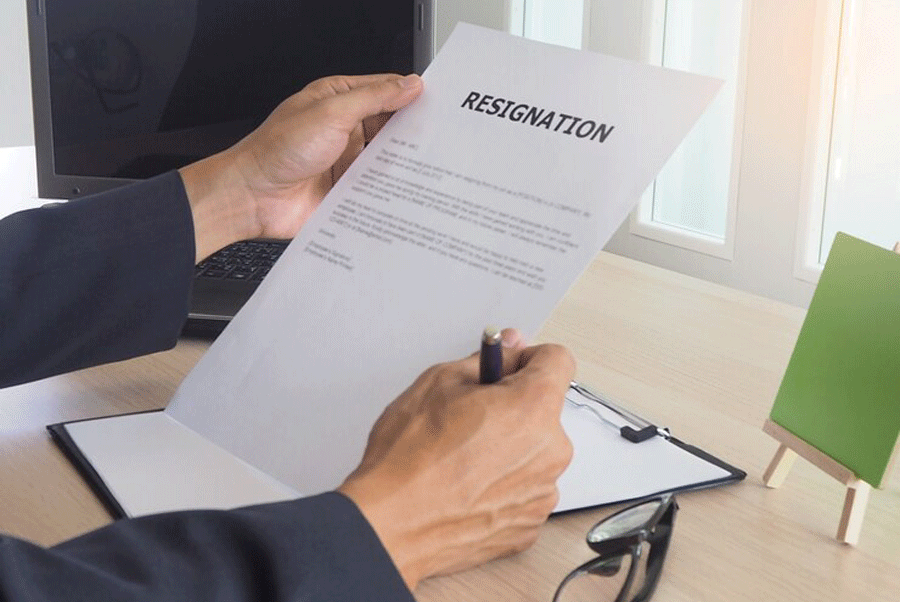Any nurse thinking about resignation will often wonder how to go about resigning from the job. As a matter of professionalism, you should always let your soon-to-be former employer know when you intend to resign by notifying them of your last day at work and the reason for resigning through a resignation letter. Giving advance notice greatly influences the type of reference or recommendation you get from your employer(s) and can thus make it easier for you to find a new position in a different organization.
A nursing resignation letter is a document used to formally notify your employer that you have terminated your employment/job as a nurse with the organization. A nurse sends the letter as a formal notice to their supervisor or employer that they will no longer be working at the medical facility. Additionally, submitting a resignation letter gives your employer enough time to find a replacement and adjust to the changes.
Typically, advanced notice of 6-8 weeks is considered reasonable in the healthcare industry. This gives enough time to allow a smooth transition and assimilate the new nurse. Finally, the letter is filed with company records to document that the nurse voluntarily terminated their duties. So, if you are considering resigning from a nursing job, this article will show you the best way to give notice.
Free Templates
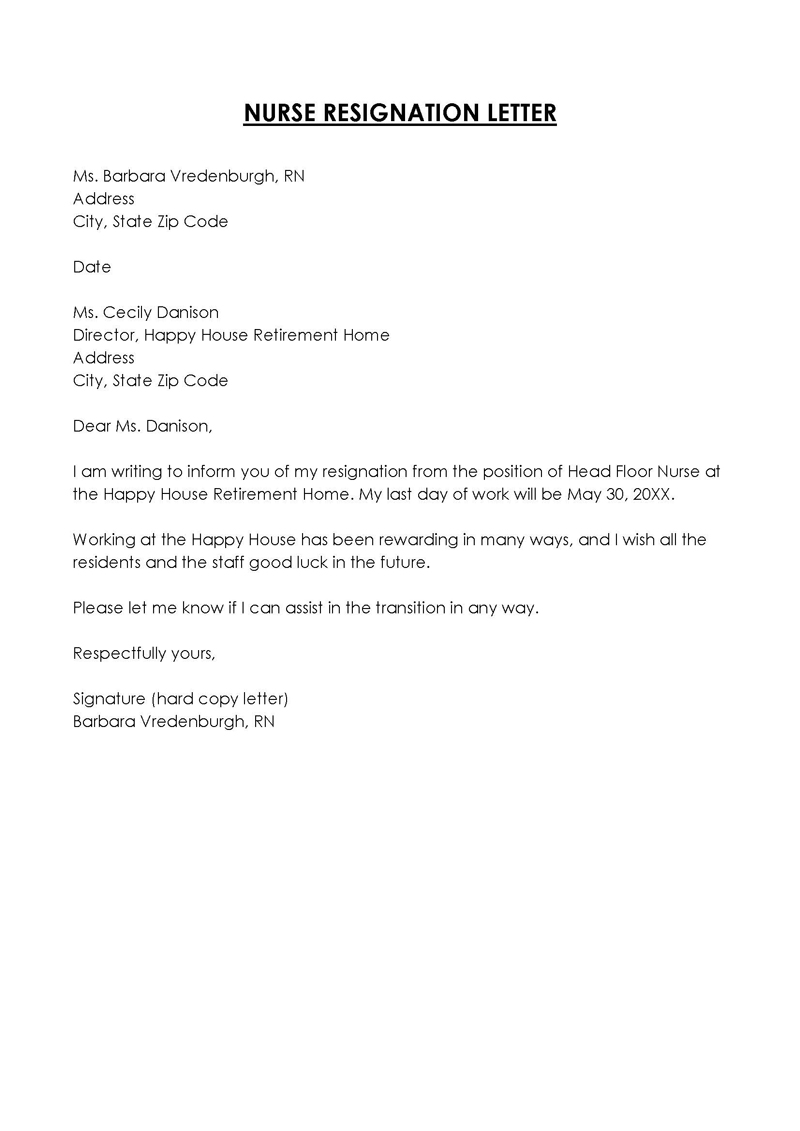
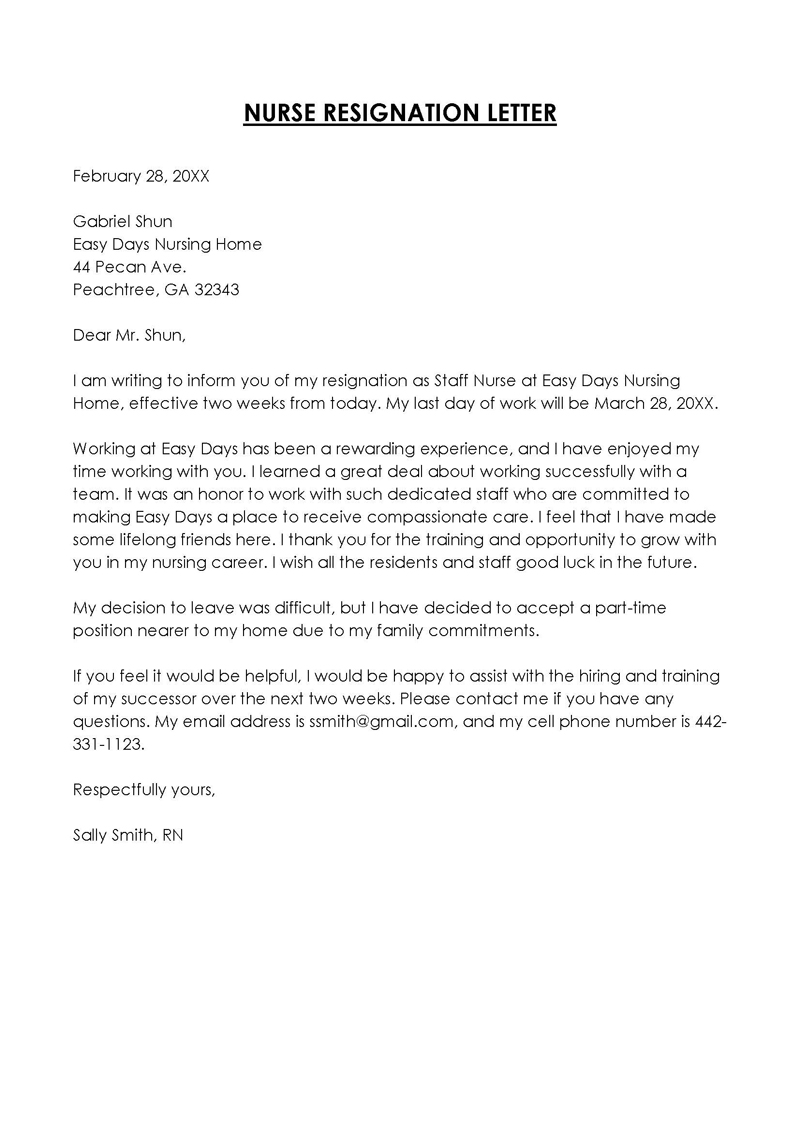
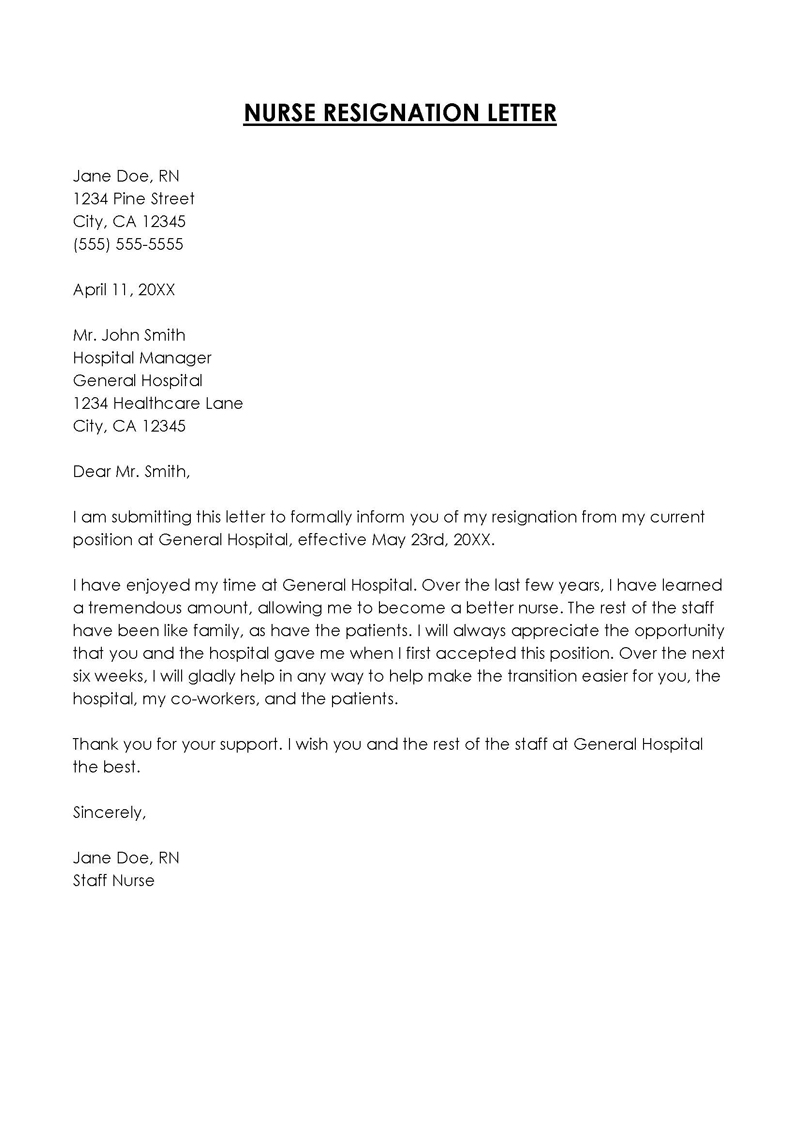
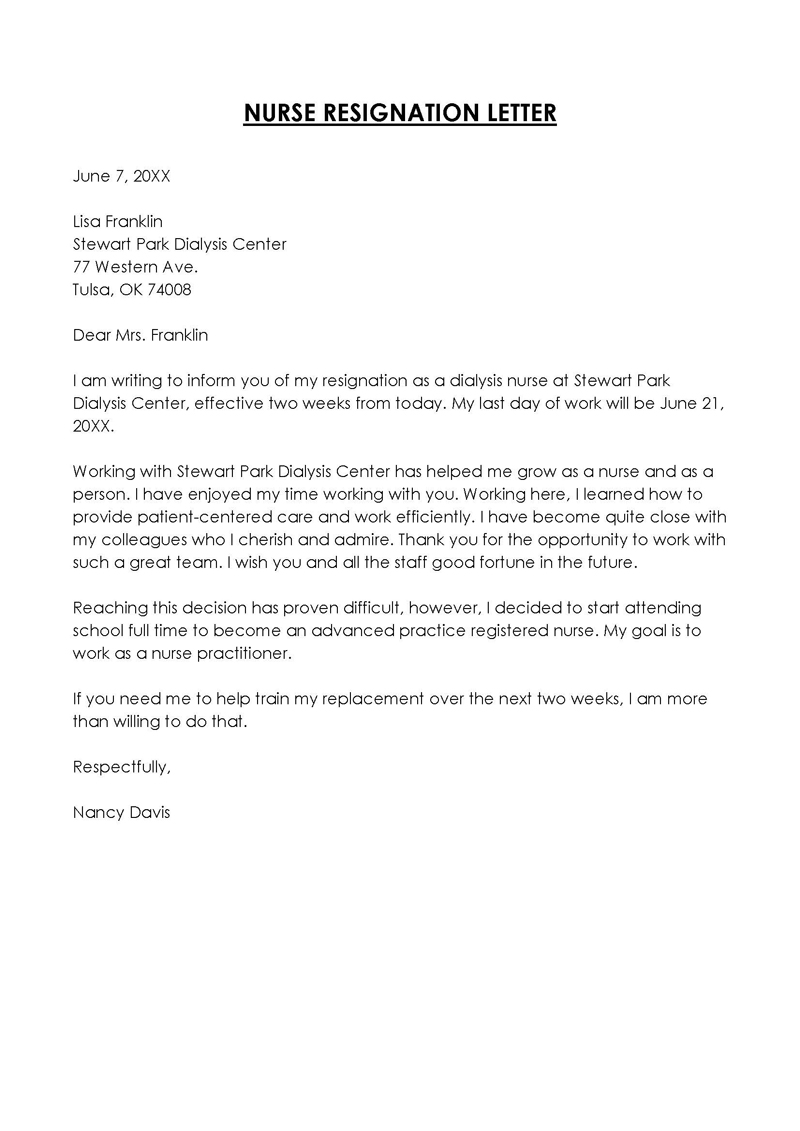
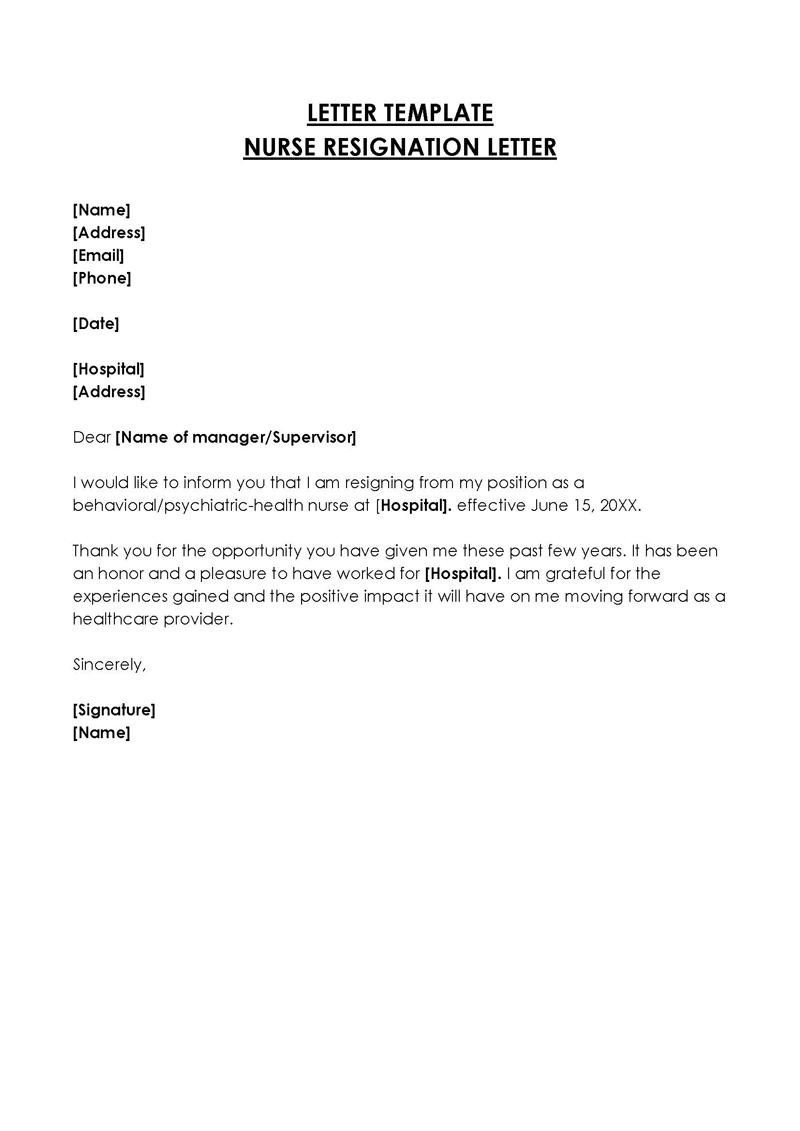
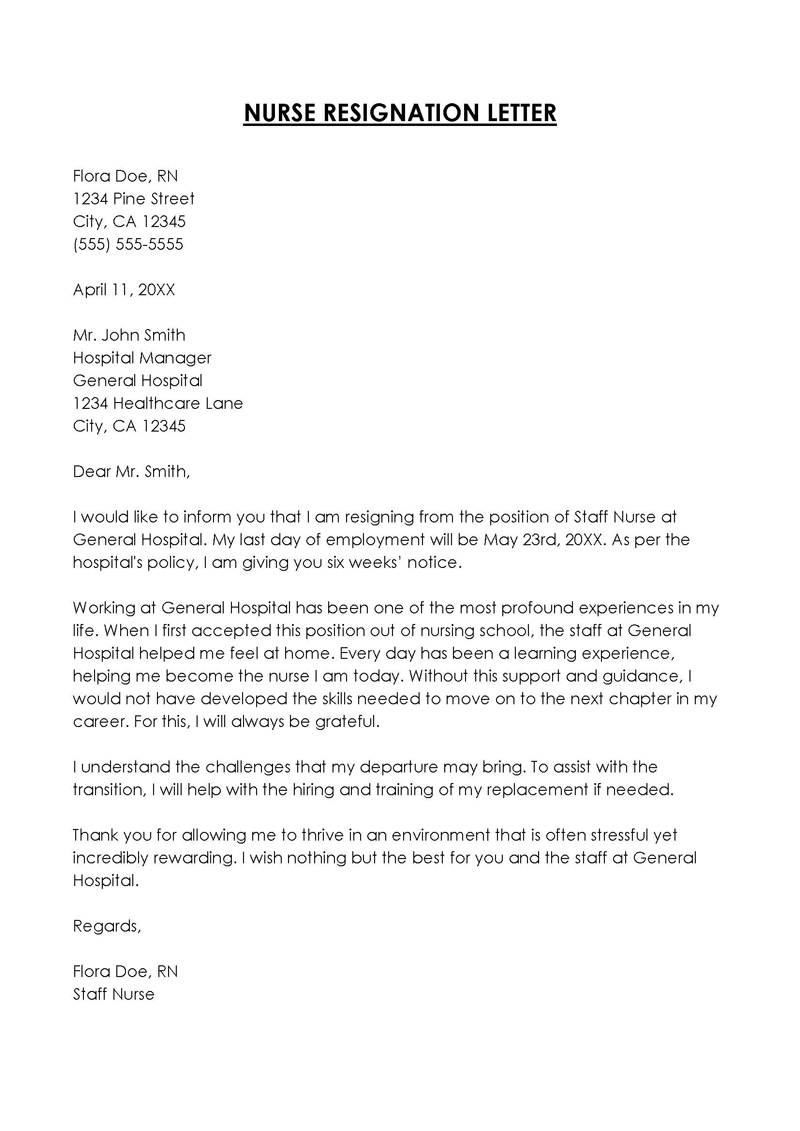
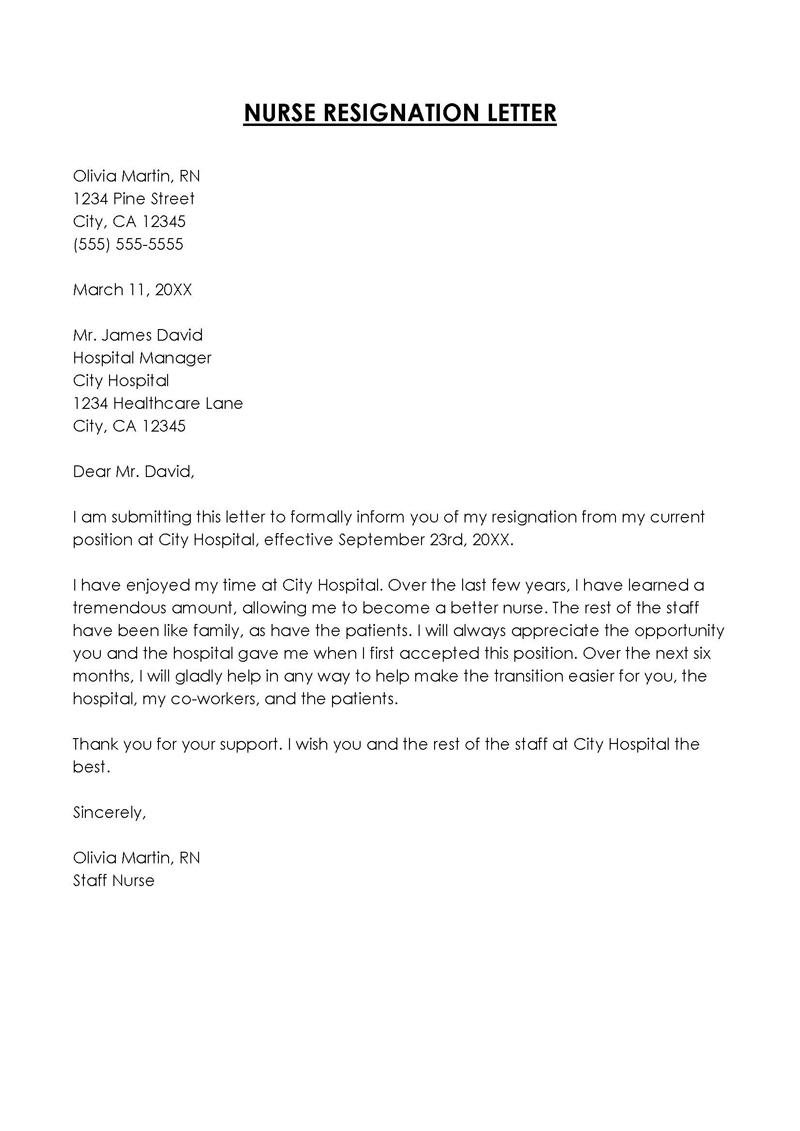
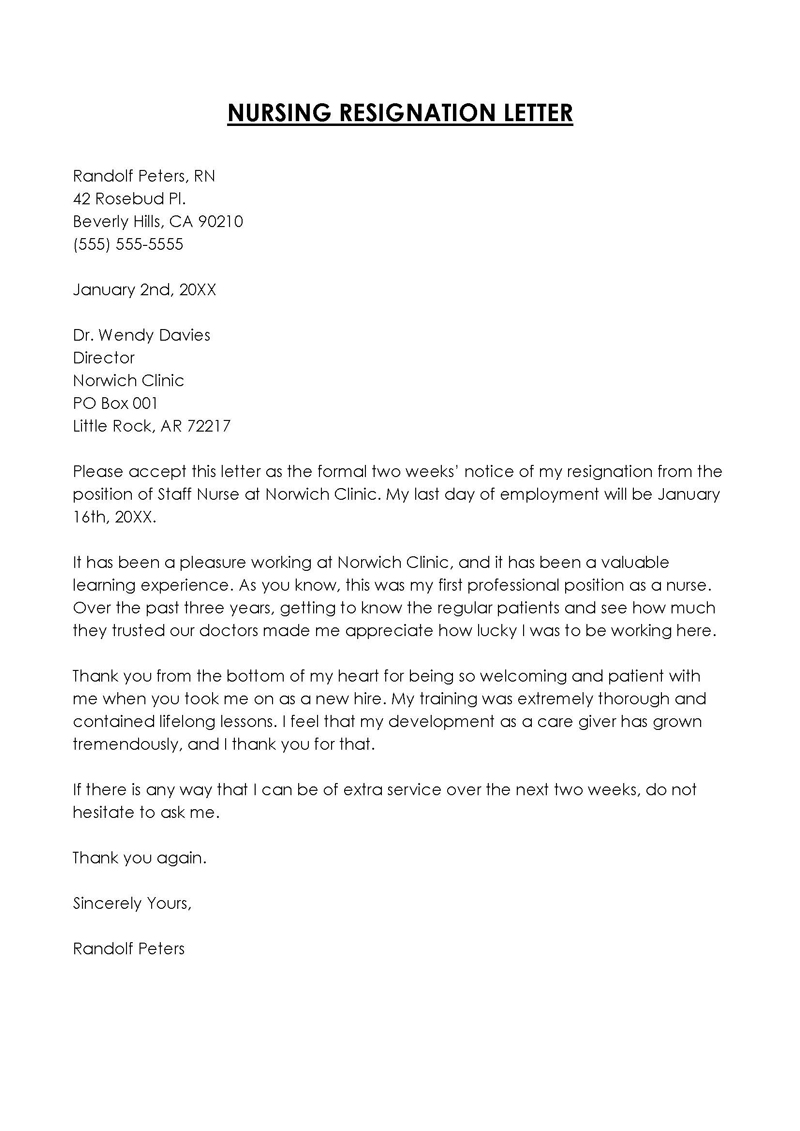
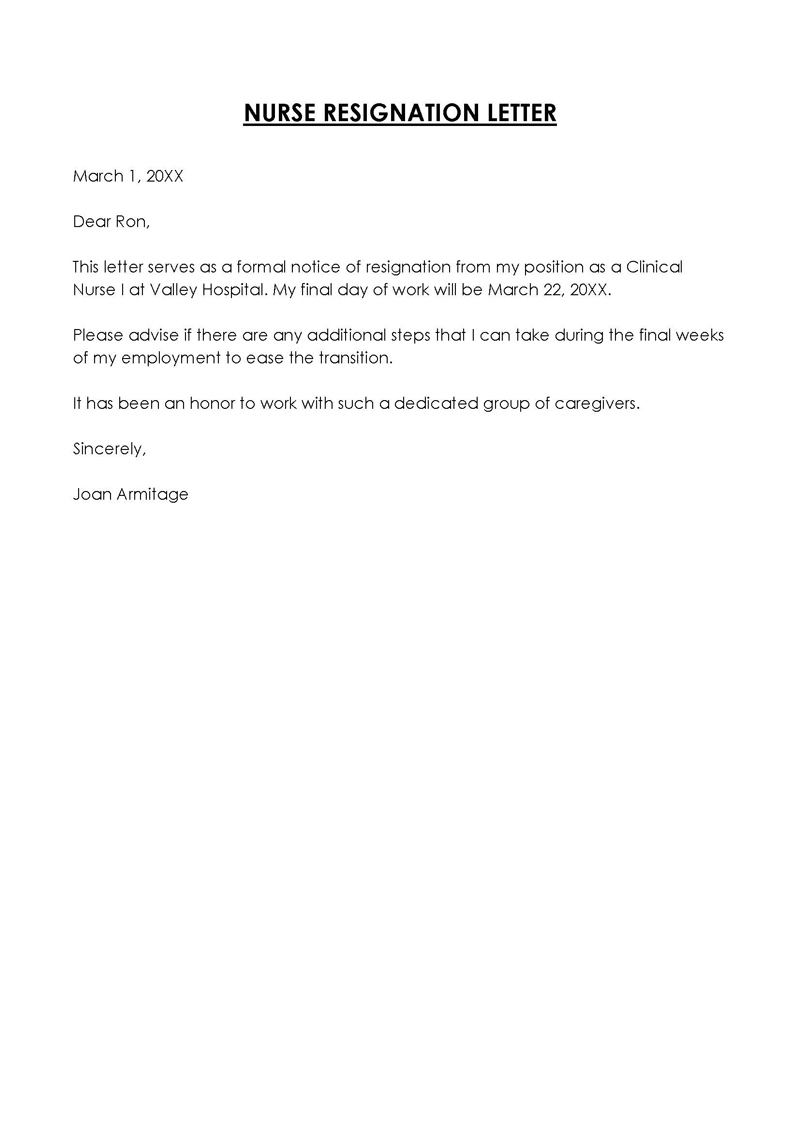
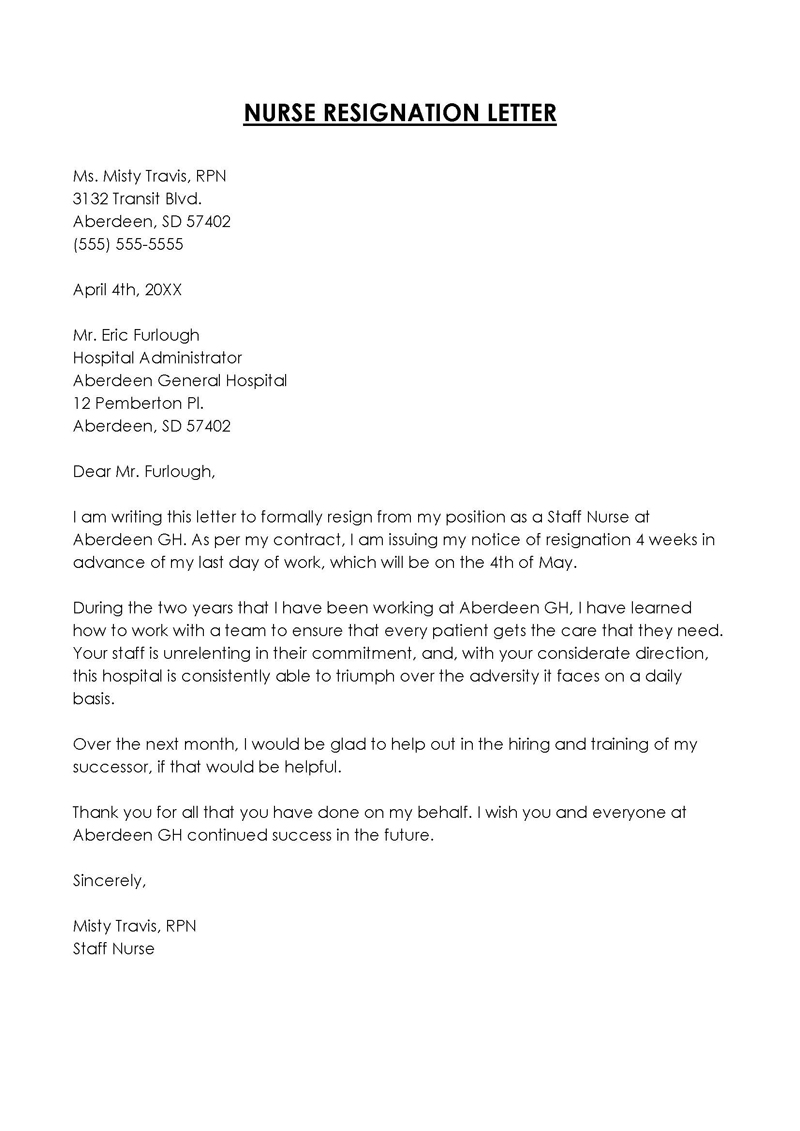
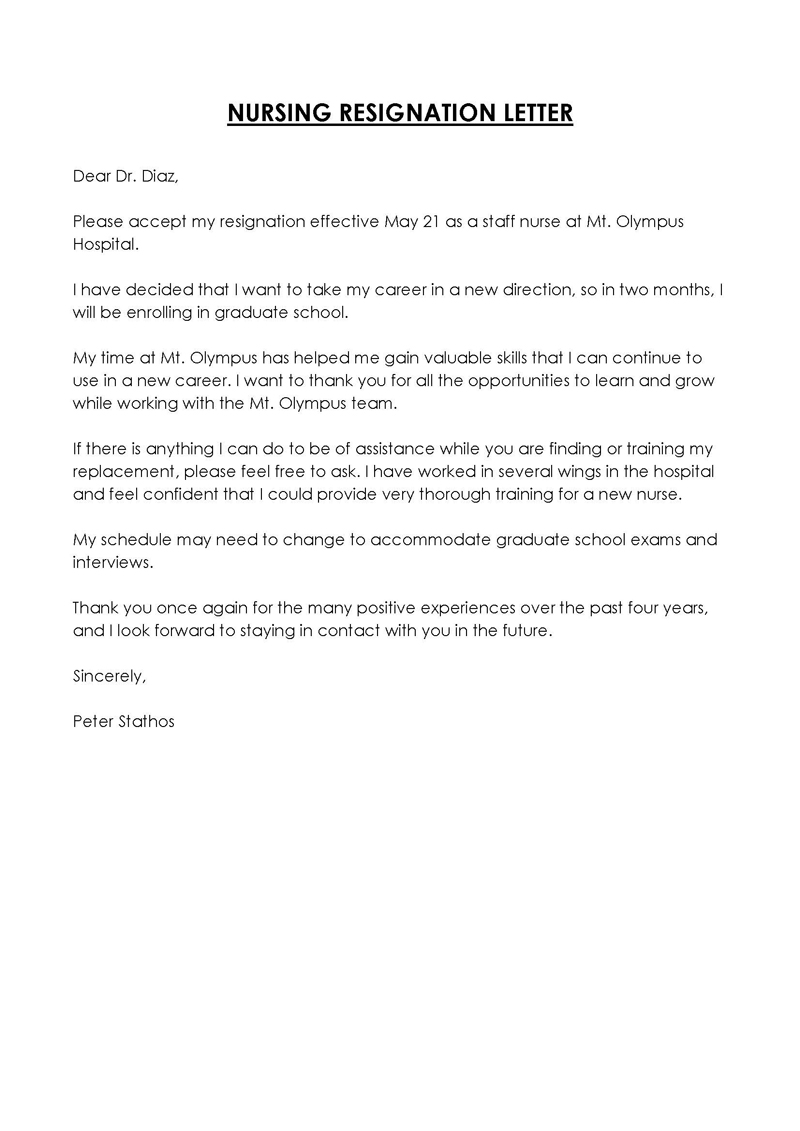
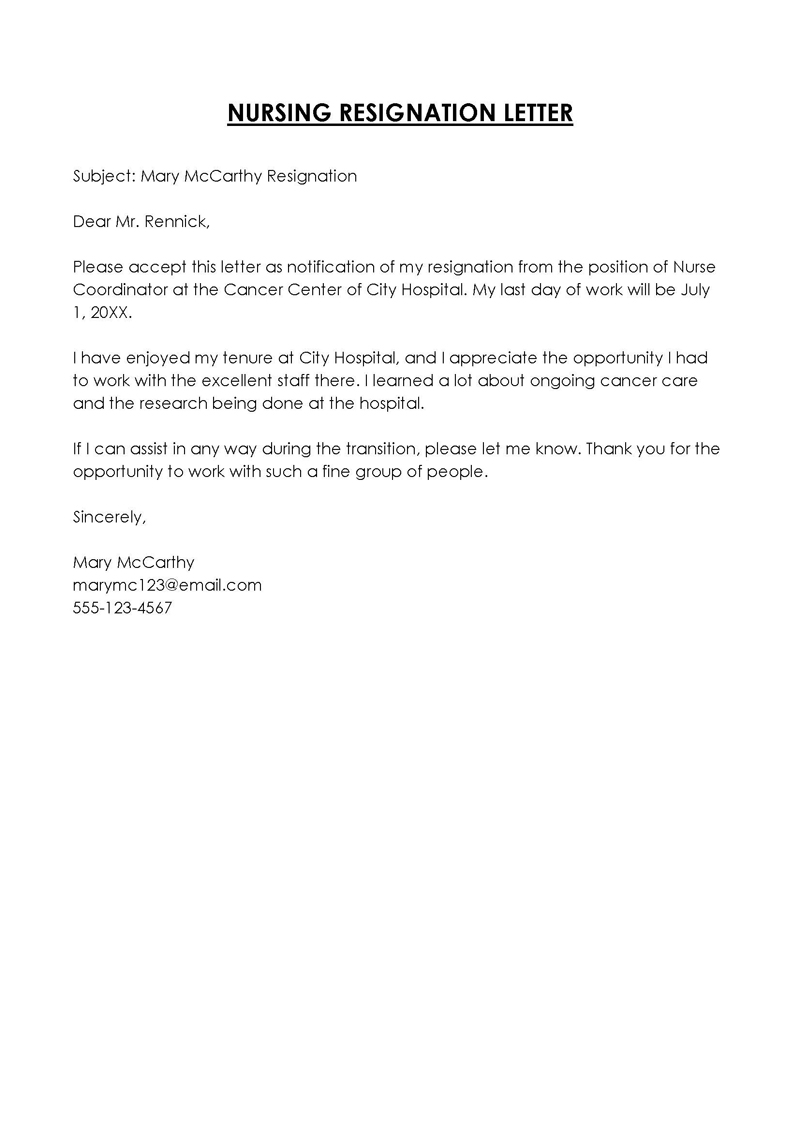
Pre-Considerations
Resigning from your place of work is often a sensitive matter. As a result, you must tread carefully to ensure this process is completed without compromising on any professional relationships and networks you’ve created in your time with the organization. Therefore, you should consider certain things before crafting the letter.
These include:
Control your emotions
Before writing the resignation letter, the first thing is to put aside and be in control of your emotions. This is true regardless of the reason. Nursing is a demanding job, and as a result, committing to it will usually come from a place of passion, which might lead to being attached to the organization, colleagues, patients, etc. Therefore, resigning can be overwhelming due to the emotions involved. However, you should be in control to ensure this is not reflected in your letter. This helps you to remain objective in your thoughts and actions.
Consult with management
Before writing your letter, communicate with your manager and HR to see what agreement you may have to make to reign. This should be done before relaying any information to your colleagues and patients. Most healthcare institutions will have policies in place that guide the resignation process.
Identify what requirements you must fulfill to ensure you’re compliant. This way, you will be able to minimize any disputes arising during the process because it helps reduce confusion. Also, you must aim to communicate with management in person. Resignation letters will always follow announcements from your supervisors.
Give notice and date of departure
Most employers require at least two weeks’ advance notice for any nursing staff. Hence, you must always be aware of the date you intend to officially quit your responsibilities to satisfy the notice period requirements. In addition, some institutions will have other specific notice period guidelines or norms, so you should first check what guidelines are in place and plan your exit in compliance with the applicable rules.
Writing the Letter
When writing it, you should include important information such as the reason for leaving, your anticipated last day of employment, and how you would like to assist with the transition. You should then sign and date the letter and keep a copy for the record.
The standard format for this type of letter is as follows:
Header
Relevant correspondence is required in any resignation letter since they are formal letters. This should include your name, title, contact details, date, and the name and contact details of the company where you are employed. In addition, the header should be placed at the top of a section of the page.
Salutation/introduction
Next, you should provide a formal salutation to the recipient. Formal salutations are formatted as shown – ‘Dear Mr./Mrs. (last name).’ Ensure to use the appropriate title, such as Dr., if applicable. Then, in your letter, you should include a short paragraph that introduces the reader to the reason for writing. Make sure to mention your intent to resign, your position in the organization, and your last day of work. The introduction can be given in 2 or 3 sentences, as it does not have to be too long.
The body
In the body of the letter, carefully explain why you are resigning, a message of appreciation, noteworthy experiences, lessons from your tenure with the organization, and how you can help with the transition. The body of the letter should be concluded with a thank-you statement to your employer. Use this letter section to show you are leaving on good terms. The body can be 2-3 paragraphs long, but you shouldn’t make it too long with unnecessary information.
Conclusion
Lastly, you should close the letter for the nursing position with a formal complimentary close such as “Best Regards,” “Sincerely,” or “Yours faithfully.” This should be followed by your signature at the bottom.
Resignation Letter Template for Nursing Professional
[Your Full Name]
[Your Job Title]
[Your Current Workplace]
[Workplace Address]
[City, State, Zip Code]
[Your Phone Number]
[Your Email Address]
[Date]
[Supervisor’s Full Name]
[Supervisor’s Job Title]
[Workplace Name]
[Workplace Address]
[City, State, Zip Code]
Dear [Supervisor’s Full Name],
I am writing to formally resign from my position as [Your Job Title] at [Your Current Workplace], effective [Last Working Day, typically two weeks from the date of the letter]. This decision has not been easy and comes after careful consideration of my professional and personal goals.
During my time at [Your Current Workplace], I have grown both personally and professionally. I am grateful for the opportunities I have had to work with a dedicated team and serve our patients with care and compassion. The experiences I have gained here will undoubtedly influence my nursing practice for years to come.
I am committed to ensuring a smooth transition and will do everything in my power to hand over my responsibilities effectively. I am willing to assist in training my replacement and will ensure that all my duties are up to date before my departure.
Please let me know how I can further assist in making this transition as seamless as possible. I would like to express my sincere thanks for the support and guidance I have received during my tenure at [Your Current Workplace]. I look forward to staying in touch and hope our paths cross again in the future.
Thank you once again for the opportunity to be a part of the [Your Current Workplace] team. I wish you and the department all the best moving forward.
Sincerely,
[Your Signature (if sending a hard copy)]
[Your Printed Name]
Sample Letter of Resignation
Dear Dr. Holden,
Please accept this letter as formal notification of my resignation from my role as Registered Nurse in the Pediatric Department at City General Hospital, with my last day being February 21, 20XX, two weeks from today. After considerable thought about my career and personal aspirations, I’ve decided to take this step.
The journey I’ve embarked upon at City General Hospital has been both fulfilling and enlightening. The chance to make a difference in the lives of our young patients, collaborate with an exceptional team, and enhance my professional skills has been a privilege. The knowledge and experiences I gained here will undoubtedly influence my nursing practice well into the future.
To facilitate a seamless transition, I am fully prepared to assist with training my successor and ensuring all my current responsibilities are up to date. I welcome any specific instructions you might have for me during this period to ensure continuity of care for our patients.
I want to express my sincere appreciation for the mentorship, support, and team spirit I’ve experienced here. Working under your leadership and alongside my colleagues has been a highlight of my career. Although I am looking forward to my next chapter, leaving this team will be bittersweet.
Thank you once more for the opportunity to contribute to the Pediatric Department. I am eager to keep in touch and optimistic that our paths will cross again. Should you require any further assistance or have any questions, please feel free to contact me.
Warm regards,
Sarah Torres, RN
Pro Tips
It would be best if you always aimed to write a letter that effectively communicates your intentions formally and respectfully. This is regardless of the reason for resigning. To this effect, you should include these tips when writing the letter:
Keep it short
Since your objective is to inform the supervisor of your employment intentions and plans, only use a short letter. There are no specific rules for what words to use but make sure you don’t exceed one page.
On the other hand, resist the temptation to write a long letter with unnecessary information. Following a structured process when crafting a letter like the one provided in this article will ensure you communicate your message with less but relevant information.
Use appropriate fonts
Use a professional/formal font, such as Times New Roman and avoid stylized fonts. Other decorative fonts make the letter seem unprofessional. Instead, use a consistent font throughout the letter.
Use the correct margins and spacing
Always start your letter with a header at the top left-hand corner. Also, use a margin space of 1 inch on all sides and a line spacing of 1.15. You will have space to write your name, title, contact information, a formal salutation, and a professional signature and name at the bottom. These margin and spacing guidelines will also ensure the letter’s content will be displayed clearly without the recipient having to strain themselves.
Be respectful
Your tone is essential in the letter. It should be reflected in the language used. The tone should be formal enough to show you are still committed to being professional even as you leave. With that in mind, avoid complaining or badmouthing your colleagues or employer, even if you are in conflict.
Proofread the letter
As with any other letter, you should proofread the letter and correct any errors identified. Additionally, once you are done with the content, get another set of eyes to proofread it for errors in spelling and grammar that may affect the professionalism of your letter.
Final Thoughts
Many nurses have different reasons for leaving their jobs or moving to another hospital. Conveying this decision to your superiors can be difficult. However, the most effective way is through an in-person meeting and a formal letter. It would be best if you used formal language for your communication when writing the resignation letter since this is an official correspondence.
Avoid using informal abbreviations such as standard in-office phrases since they are inappropriate for informal correspondence. How well you craft your letter can set precedence for your relationship with your former employer, which significantly affects your chances of getting a good recommendation in the future if you need one. The guidelines in this article, if followed correctly, can help you craft a strong resignation letter that protects your relationship with former employers.








